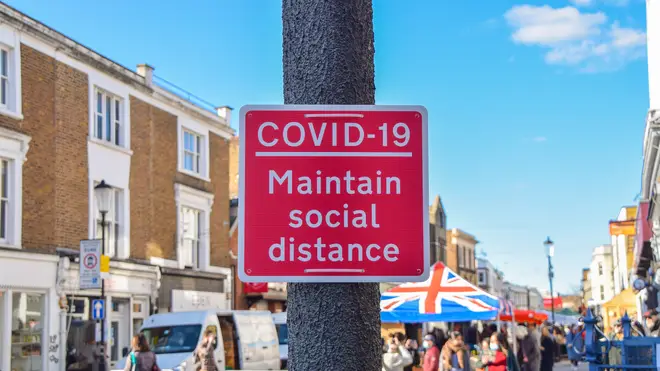
Nick Abbot 10pm - 12am
27 February 2021, 11:39

Good communication with the public is vital to prevent people abandoning social distancing measures after being vaccinated, a committee of experts advising the Government has warned.
The Scientific Advisory Group for Emergencies (Sage) said those who had received a jab might be less inclined to stick to the rules unless the science behind transmission is explained to them.
In a recent paper, the group added that the success of the vaccine rollout may mean even those who have not had a dose may "perceive there is no longer a major risk to vulnerable people".
Sage noted 20 per cent of UK adults have received a first dose of vaccine while 16% believe they have recovered from the virus - a belief associated with perceptions of immunity.
It warned these figures may create the impression the threat has permanently receded, making it harder to stick to restrictions on seeing friends or family.
Read more: Rishi Sunak says UK economy will face 'enormous strains' post-lockdown
Read more: Military should step up ‘more often’ in UK crisis response, General Sir Nick Carter tells LBC

GP Sir Sam Everington worries 'enormously' about jab hesitancy
"As restrictions change, messaging should be careful to ensure that the importance of continued adherence to protective measures is well explained," Sage said.
The group also warned it could create new problems for policing as more people may start to believe social distancing measures are illegitimate.
It said unless measures are either relaxed or their continued necessity explained, it could lead to "resentment and lower levels of compliance" with the law.
So far, police forces across the UK have been using an "engage, explain, encourage and enforce" strategy.
Sage said this strategy of persuasion could become less effective if people believe they should no longer be subject to restrictions.
It also advised against vaccine certificates or passports, warning they would "amplify grievances" if they were used by some as proof they should be exempt from local restrictions.
Sage also said businesses may try and implement their own forms of proof-of-vaccination documents, which could contradict the Government's position on slow easing of lockdown.

"Do not wreck this now," warns Professor Jonathan Van-Tam
The paper said: "To preserve legitimacy, the road map out of lockdown will need to provide clear messaging and transparent criteria.
"For policing it needs to set out in very clear terms which behaviours, activities and venues are not allowed, where and how the boundaries will be drawn, and why."
Deputy chief medical officer for England Professor Jonathan Van Tam has urged the public not to be lulled into a false sense of security as the vaccine rollout gathers pace.
At Friday's Downing Street press briefing, he said: "It is a bit like being 3-0 up in a game and thinking, 'We can't possibly lose this now' - but how many times have we seen the other side take it 4-3?
"Do not wreck this now. It is too early to relax. Just continue to maintain discipline and hang on just a few more months."
Sage warned that even with the vaccination programme, there is still the possibility of a resurgence that could lead to an even high number of hospital admissions and deaths than seen in January if measures are released too quickly.
"Retaining a baseline set of policies to reduce transmission after other restrictions have been lifted would reduce the scale of a resurgence," the paper said.
Sage added that future localised lockdowns may strain public trust in the Government, particularly as more deprived communities are the most likely to be subject to interventions.
It said hyper-local restrictions must be "transparent, with consistently stable justifications and messaging concerning decision-making".
"This will require a very clear message about what control measures are intended to achieve, where and why they have been applied, and what will be required to enable relaxation, alongside adequate financial and other support," the paper said.